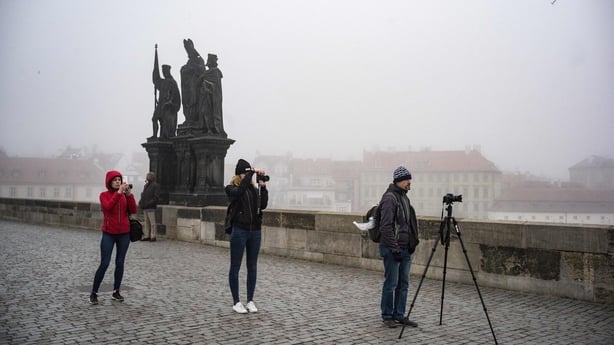Sweden will lift pandemic restrictions next week despite record levels of infections as it banks on booster shots and high rates of past Covid-19 infections to keep hospitalisation rates manageable.
Current restrictions, which include bars and restaurants having to close early and a cap of 500 people inside larger indoor venues, were extended last month until 9 February.
"It's time to open Sweden up again," Swedish Prime Minister Magdalena Andersson told a news conference.
"Looking ahead, infection rates will remain high for a while longer, but as far as we can judge, the worst consequences of the contagion are now behind us," she said.
Fuelled by the more contagious Omicron variant, Sweden has repeatedly set newly daily case records over the past month that has strained the healthcare system, although to a lesser extent than in previous waves.
Sweden stood out early in the pandemic by spurning lockdowns, mainly relying on voluntary measures focused on social distancing and good hygiene, though somewhat tighter restrictions were gradually adopted in successive waves.
It has seen deaths per capita run much higher than in its Nordic neighbours but lower than most European countries that opted for lockdowns.
Some recommendations, such as getting vaccinated and isolating at home when sick, will remain in place and they will be more restrictive for the unvaccinated, Health Minister Lena Hallengren told the news conference.
Amid increasing evidence that Omicron results in less severe disease than previous variants, she added the Health Agency will also propose that the virus no longer be designated a threat to society, though it would still be closely monitored.
Czech government plans to end Covid passes, easing measures for unvaccinated
The Czech Republic will stop requiring Covid passes for entry to restaurants and other service or entertainment venues starting next week, opening them up to unvaccinated people, Prime Minister Petr Fiala said.
The country of 10.7 million, which was hit hard by previous waves of the Covid pandemic, is seeing a record spike in coronavirus cases as the Omicron variant spreads. However, officials expect an easing of infections this month.
The Health Ministry reported a record daily tally of 57,226 Covid infections on Tuesday, plus nearly 10,000 suspected re-infections
But hospitalisations have not yet jumped and are well below peaks in previous waves of the pandemic. The government has sought to end some measures.

From 9 February, the need to show proof of vaccination or being recently recovered from Covid-19 to enter restaurants and other hospitality or service venues will end, Mr Fiala said in a statement.
The government will also finish mandatory testing in firms and schools from 18 February.
Measures requiring mask wearing indoors and limits to the number of people at public events will remain.
The moves follow easing planned in other European countries. Neighbouring Austria will allow shops and restaurants to remain open longer and also ease restrictions on the unvaccinated from next week.
Yesterday, Italian Prime Minister Mario Draghi said Italy would soon announce a timetable to roll back its Covid-19 curbs.
Bali to welcome first international tourist flight amid cautious reopening
Indonesia's holiday island of Bali will welcome its first direct flight carrying foreign tourists for nearly two years today, but just a handful of visitors will be on board to enter strict quarantine on arrival.
A Garuda Indonesia flight from Tokyo is scheduled to arrive in Bali in the afternoon, with six foreigners and six Indonesians aboard, said an official at the Bali Government Tourism Office.
Though the island officially opened to visitors from China, New Zealand, Japan and a few other countries in mid-October, there have been no direct non-cargo flights since then.
The six foreign tourists arriving from Tokyo were travelling using business visas since the new rules for tourists were not ready when they applied to come.

Indonesia has said restarting international flights is intended to boost Bali's battered tourism sector, which usually accounts for 54% of its economy.
Known for its surfing, temples, waterfalls and nightlife, Bali drew 6.2 million foreign visitors in 2019, the year before Covid-19 struck. The entire country recorded just 1.6 million foreign visitors last year, down 61.57% from 2020.
However, Indonesia is maintaining much stricter quarantine requirements than Southeast Asian neighbours Thailand, which resumed quarantine-free entry for vaccinated visitors from Tuesday and the Philippines, which will do the same from 10 February.
Vaccinated tourists to Bali must quarantine between five and seven days at hotels or on vessels offshore.
Bali's slow reopening comes as Indonesia has been seeing a steady increase in Covid-19 cases, primarily driven by the Omicron variant. The country reported nearly 18,000 infections yesterday, the highest tally since August.

